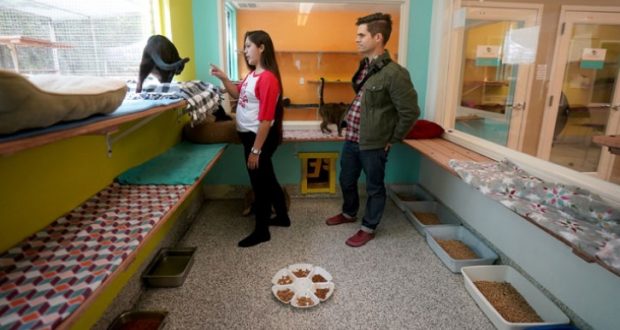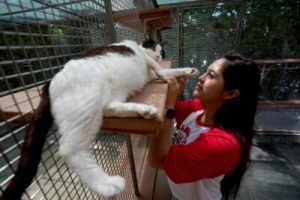FRESNO STATE — Some of Valerie Guzman’s earliest childhood memories include taking in stray cats with her family in their Santa Maria apartment. “We would take in the cats that no one wanted – some were pregnant, had health problems or were infested with fleas,” Guzman said. “We would nurse them back to health and find them a home.”
Guzman earned bachelor’s degrees from Long Beach State University with a double major in child development and family education in 2016. But after four years of working with children with behavioral problems, she was drawn to apply what she had learned about behaviors to helping “unadoptable” cats.
Despite pressure from her parents to settle down and have a family, Guzman said she decided to follow her dreams and pursue a master’s degree in Applied Behavior Analysis at Fresno State. The program emphasizes behavior analytic applications with typically developing and developmentally disabled children and adults. However, Guzman’s research draws a parallel to her work with animal behavior. “We focus on behavior, and behaviors are everywhere, including animals” Guzman said. “Within my thesis, I’m presenting that assessments that we use with humans can also be successful with animals because it’s not dependent on the population, but the behavior.”
 Guzman will celebrate earning her master’s degree at Fresno State’s College of Science and Mathematics commencement ceremony at 5 p.m. on Friday, May 20, at the Save Mart Center.
Guzman will celebrate earning her master’s degree at Fresno State’s College of Science and Mathematics commencement ceremony at 5 p.m. on Friday, May 20, at the Save Mart Center.
“On one hand my parents didn’t understand why I wanted to go back to school after receiving my bachelor’s degree. On the other hand, I know that furthering my education would change my life trajectory,” Guzman said. Guzman was thrilled when she was accepted into the master’s program, and jumped at the opportunity to research animal behavior alongside Dr. Steven Payne in the Psychology Department. Payne helped establish a partnership with Valley Animal Center, a shelter that helps thousands of cats and dogs find loving homes each year.
“Since we started our partnership eight years ago, my lab has been focused on increasing the welfare of shelter animals,” Payne said. “Valerie fits in well with our lab’s mission, and her research is on the cutting edge of the animal shelter literature.” Guzman researched trial-based functional analysis tools to discover the motivations behind “unadoptable” cats’ behaviors. In her research, she worked with three cats that had displayed aggressive behaviors: 11-year-old Friday, 6-year-old Sonny and 2-year-old Princess Rosalinda.
“Everyone has heard of a dog trainer but has never heard of a cat trainer,” Guzman said. “The key to successful training is to figure out what triggers the repeated behavior and what the cat gets from displaying that particular behavior so you can change the conditions.” All three of the cats in the study showed significant improvement in their aggressive behavior. The behavioral methods used by Payne and Guzman will be relayed to staff in hopes of helping more cats get the opportunity to be adopted.
 “Our long-lasting partnership with Valley Animal Center has led to fantastic outcomes for the animals, for Fresno State students and for research in the field of Applied Behavior Analysis,” Payne said. “We hope to continue helping animals in the Central Valley far into the future.”
“Our long-lasting partnership with Valley Animal Center has led to fantastic outcomes for the animals, for Fresno State students and for research in the field of Applied Behavior Analysis,” Payne said. “We hope to continue helping animals in the Central Valley far into the future.”
Guzman explains there is a stigma that cats cannot be trained. “I don’t want my research to end here – I want to teach others about these methods.” Her ultimate goal is to start a non-profit to train staff on effective behavioral methods. “I want to give every cat a chance at adoption.”
By Selene Kinder.







